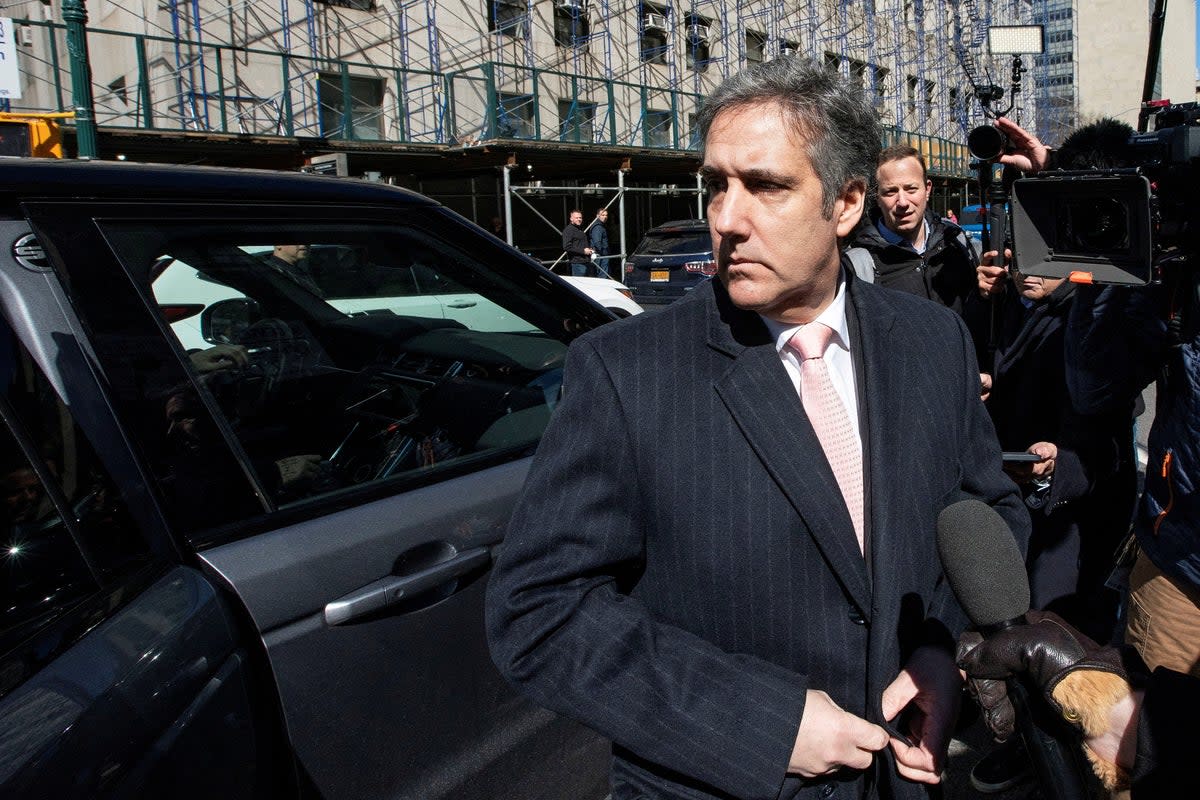The ‘fixer’: How Michael Cohen’s efforts to help Donald Trump could land his ex-boss in jail

- Oops!Something went wrong.Please try again later.
- Oops!Something went wrong.Please try again later.
Former attorney Michael Cohen was once Donald Trump’s top operative: a “fixer” who handled matters both legal and otherwise for the celebrity businessman-turned-political candidate.
But as Alvin Bragg’s grand jury investigation concludes in Manhattan this week, it’s clear that Cohen’s efforts to “fix” problems for his boss may have caused far more harm than good.
In the autumn of 2016, Cohen was still serving as an attorney and longtime colleague of the presidential hopeful he would later go on to call a racist, a con man and a fraud in sworn testimony to Congress. As part of that job, he connected with a woman named Stephanie Clifford — aka porn star Stormy Daniels — and started making a deal.
The terms of that deal were simple: Daniels would cease her efforts to shop a story of her alleged affair with Trump to journalists around the country, thereby removing a last-minute landmine for the Trump campaign already battered with the damning audio of his Access Hollywood comments about sexually harassing women, reported just weeks earlier. She’d stop talking about it to anyone, in fact, and would sign a nondisclosure agreement opening her up to arbitration if she did otherwise. In exchange? A one-time payment of $130,000.
It was the perfect plan, and to some extent it worked: Daniels signed the NDA, and in the days and weeks to come would not appear in any major news publications sharing her side of events. Fox News even killed a story on the matter, though whether that was due to Danielss’ non-cooperation or the network’s own sharp pro-Trump bent is less clear.
But just a year after his boss would be sworn in as president, the wall of secrecy crumbled. The Wall Street Journal had the entire story, including the hush money payment, and Cohen found himself unable to say, “no comment”. Days after it comes out, he admits to making the hush payment — an admission, along with financial records of the deed itself, that would later get him thrown into prison. Another leak-prone member of the Trump legal team, Rudy Giuliani, would go on to admit on national television that Trump had not only known about the payment (at some point in time), but had reimbursed Cohen for his service.
The question then became whether Trump knew about the payment. Two options were possible: Number one, Trump both knew of his attorney’s actions as they occurred and implicitly approved of them; or number two, Trump only found out about the hush payment afterwards but still apparently approved of it and went through with reimbursing Cohen for it anyway.
Both possibilities have the potential to implicate Trump in wrongdoing, though the former clearly would show intent to violate the law. Cohen’s payment to Daniels was considered to be both unreported and excessive in its amount and nature; should prosecutors be able to prove that the contributions were made at the former president’s direction, it could be an open-and-shut case for a jury.
Spurned by his former boss, within a year of the Daniels matter going public Cohen was in front of any camera that would have him warning about the dishonesty and fraud that he now says was always part of his former boss’s operation. In testimony to the House Oversight Committee in February of 2019, he implicated the Trump Organization in a scheme to inflate or deflate the value of certain assets for the purposes of fraudulently obtaining better tax rates or more favourable loan terms; those claims are now at the core of New York state Attorney General Letitia James’s lawsuit seeking to bar the company from doing business in the Empire State.
More recently, he has offered testimony to the grand jury empaneled in January by Bragg in Manhattan to investigate the Daniels matter. Six years after the deed occurred, it may finally wind up leading to the very first criminal charges levied against a former US president in history.
But even so, his flip-flop on the issue of support for the former president — not to mention his stint in prison for lying to Congress — are issues challenging his credibility, and the strength of his testimony to investigators. A former legal adviser to the president said as much on Monday when he testified to the grand jury in Manhattan and trashed Cohen’s reliability as a witness.
A potential prosecution of Trump is far from a done deal just yet, and even less certain is Cohen’s own future. Disbarred in New York and unlikely to pick up a cable news gig like other ex-Trump campaign and administration officials, it’s unclear what futures remain open to the man who was once no. 2 to one of the most powerful men in America.

